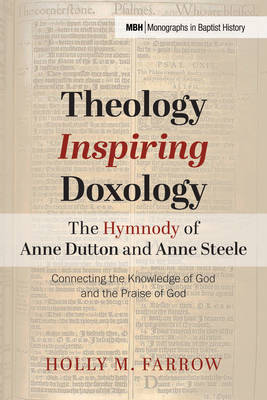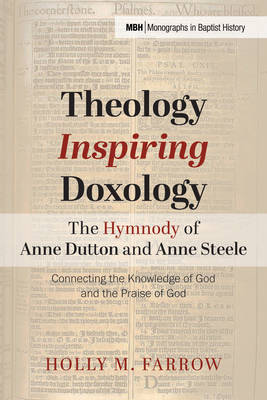
- Afhalen na 1 uur in een winkel met voorraad
- Gratis thuislevering in België vanaf € 30
- Ruim aanbod met 7 miljoen producten
- Afhalen na 1 uur in een winkel met voorraad
- Gratis thuislevering in België vanaf € 30
- Ruim aanbod met 7 miljoen producten
Theology Inspiring Doxology The Hymnody of Anne Dutton and Anne Steele
Connecting the Knowledge of God and the Praise of God
Holly M FarrowOmschrijving
From beginning to end, the hymnic voices of eighteenth-century British hymnwriters Anne Dutton and Anne Steele join the Psalmist in declaring, "Thy statutes have been my songs in the house of my pilgrimage" (Ps 119:54 KJV). With their consistent witness and faithfulness to the themes of Scripture, their hymns display an unswerving devotion to both truth and praise--theology inspiring doxology. Through an examination of poetic language and biblical content, this book explores how the hymns of Dutton and Steele illustrate a closely interwoven relationship between theology and doxology that is revealed and bound together by the word of God. The purpose of the study is to highlight the fact that biblically faithful theological reflections of the mind paired with doxological engagement of the heart enable the church to present a more complete and more excellent offering to God.
This study is the first book-length comparison of the hymns of Dutton and Steele together; the three extensive appendices present their published hymns in one volume, complete with all Scripture references provided by the hymnists themselves. The church would benefit greatly if these hymns were rediscovered, studied further, and sung once again for their scriptural integrity and doxological message of hope in Christ.
Specificaties
Betrokkenen
- Auteur(s):
- Uitgeverij:
Inhoud
- Aantal bladzijden:
- 494
- Taal:
- Engels
- Reeks:
- Reeksnummer:
- nr. 35
Eigenschappen
- Productcode (EAN):
- 9798385237296
- Verschijningsdatum:
- 15/09/2025
- Uitvoering:
- Paperback
- Formaat:
- Trade paperback (VS)
- Afmetingen:
- 152 mm x 229 mm
- Gewicht:
- 657 g

Alleen bij Standaard Boekhandel
Beoordelingen
We publiceren alleen reviews die voldoen aan de voorwaarden voor reviews. Bekijk onze voorwaarden voor reviews.







